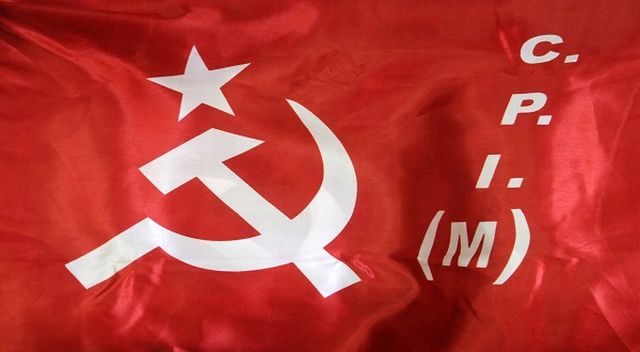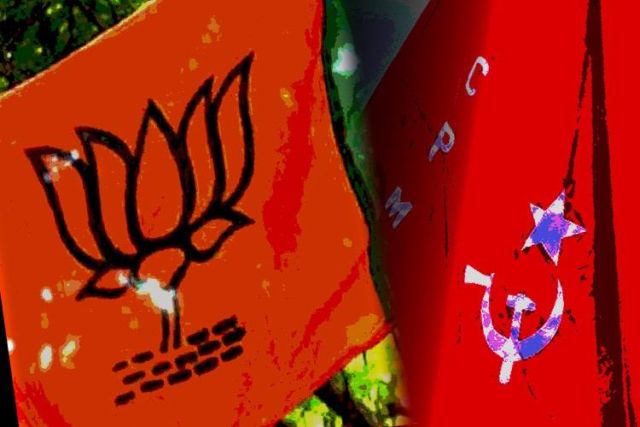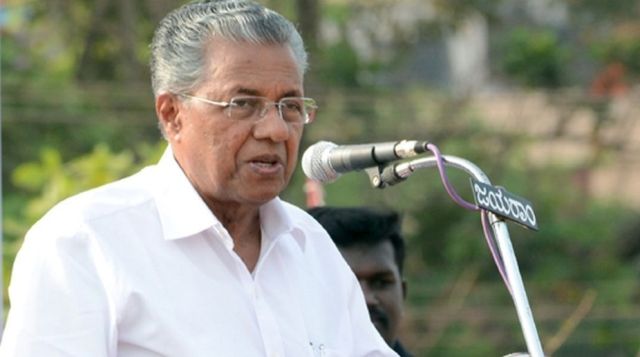
by admin | May 25, 2021 | News, Politics
 Kolkata : Condemning the armed rallies organised on occasion of Ram Navami in Bengal, the CPI-M on Monday accused state and the Central governments of indulging in “competitive communalism” to divert people’s attention from major issues of life and livelihood.
Kolkata : Condemning the armed rallies organised on occasion of Ram Navami in Bengal, the CPI-M on Monday accused state and the Central governments of indulging in “competitive communalism” to divert people’s attention from major issues of life and livelihood.
The state Communist Party of India-Marxist leadership also questioned the Bengal government’s role in curbing such violence in the name of religion and accused the state ruling’s Trinamool Congress of deliberately creating space for RSS and other Sangh affiliates to hold armed processions in the state.
“There is a planned attempt to break down the secular fabric in the state. This is intentional and politically motivated. The state government, Central government and the forces behind them are intentionally fueling this politics of division, in order to divert people’s attention from their failure in addressing the more pertinent issues of life and livelihood,” CPI-M state secretary Surja Kanta Misra told reporters here.
“Another new phenomena this year has been the competitive communalism by the state ruling party and those in power at the centre.
“The Trinamool Congress also organised Ram Navami rallies across the state this year and RSS welcomed the move. We have even witnessed that BJP and Trinamool Congress leadership in north Bengal’s Alipuduar unitedly organised a Ram Navami rally. In many places Trinamool’s presence in the rallies were academic. They left spaces open for the RSS and other forces,” he alleged.
Taking a swipe at Chief Minister Mamata Banerjee for relaxing the blanket ban on armed rallies in the state, Misra claimed the relaxation encouraged Hindutva outfits to hold so many armed rallies on Ram Navami on Sunday.
Noting that the Left parties raised questions on the state administration’s role after so many people rallied with arms during Ram Navami last year, the CPI-M leader questioned how the rallyists were allowed gather so many weapons and claimed it is certain that preparations of such magnitude cannot be made in short while, bypassing the local administration.
Warning about more such rallies to be held in the state in the next few days, Misra demanded arrest of political leaders involved in such preparations and sought an all-party meeting on the issue.
“We demand these issues to be immediately addressed. The people who were leading these rallies, are leaders of certain political parties. Both the leaders of state’s ruling party and the party ruling at the centre have been involved in promoting such actions. These people should be immediately arrested. But there is no such actions yet.
“If needed, the state government should call an all party meeting to neutralise the tensions and stop rumours from spreading. There is news that similar rallies would be held at some places today (Monday) and tomorrow (Tuesday) as well. Those need to be curbed,” he added.
—IANS

by admin | May 25, 2021 | Opinions
 By Saeed Naqvi,
By Saeed Naqvi,
The extraordinary feat the BJP has pulled off leaves one breathless. Which other Chief Minister in the country will have a decorated Director General of Police, B.L. Vohra, write in his book, “Tripura’s Bravehearts”, “Manik Sarkar was definitely unlike any Chief Ministers whom I had seen, met, worked with and heard about…. He was honest personally and that had percolated down to all echelons of the government — again one cannot find many examples of his ilk unfortunately in the country.” This level of decency has been traded by the Tripura electorate for mobs who pull down statues.
The universal assessment of Manik Sarkar even among opposition leaders in Tripura would flatter any politician. It was not just that he was himself a gentleman but he appeared to have instilled his qualities in his cabinet colleagues and the administration across the board. By all accounts, his predecessor and guru, Nripen Chakraborty, was even more admirable. The staff in the Chief Minister’s house had never ever dreamt that they would serve a boss whose groceries were purchased on a ration card and who never saved enough money to open a bank account. This may be syrupy stuff in an era when materialism is the mantra, but do, for a moment, reflect on the Chakraborty-Sarkar duo against the amoral wasteland that stretches as far as the eye can see.
Also, it is elementary that 25 years of CPI-M rule could not have lasted only because of the leadership’s decency. Despite the economic crunch, the government in Agartala implemented every central scheme with greater efficiency than any other state. Ninety-six per cent literacy? Show me another state. The gender ratio is something of a record. That is how Tripura’s middle class was created. True, having created a new middle class, the government found itself flat-footed. It could not cope with the next stage of aspirations. It produced distributive justice but found itself bereft of ideas to generate wealth to accommodate the educated unemployed and to promote two-wheel drivers to the four-wheel level.
Upon arrival in Agartala, I was able to find accommodation only in a government guest house. When I asked the Chief Minister if the absence of reasonable hotels was state policy, he was frank: “We are not in a position to cope with social imbalances that come with five-star hotels, bars and restaurants.”
This may sound odd, but the reasons for the rout of Sarkar’s Communist Party of India-Marxist (CPI-M) in Tripura are, to some extent, similar to the ones responsible for the decline of West Indian cricket.
Never again will the likes of Weekes, Sobers, Viv Richards, Michael Holding and Brian Lara adorn world cricket. In the 1970s and the 1980s, the West Indies cricket team was like Don Bradman’s invincibles. The culture of cricket was their inheritance from the British colonial period.
Aggressive globalisation of the 1990s placed the West Indies in the sphere of American media. US centered television beamed at the islanders, not cricketers but basketball and baseball stars like Michael Jordan and Jose Ramirez, with proselytising persistence. Within a generation, all that remained of the cricketing legends were their fading photographs in the scrap books of schoolboys of the 1980s in former British colonies.
A CPI-M government in Tripura was, likewise, as remote from any Left-ruled enclave as the West Indies are from cricket’s birth place. After the end of Left rule in West Bengal, it had no structure to lean on. In this friendless era it was exposed to hostile TV bombardment. Riding the crest of economic liberalisation, market fundamentalism galloped at breakneck speed to accommodate advertising for rampaging consumerism marketed by dream merchants, architects of plush malls and multiplexes.
CPI-M Chief Minister Manik Sarkar’s controlled austerities withstood this barrage of televised razzmatazz for 25 years. By this time another generation had arisen, torn between a lifestyle of simplicity and the Eldorado on the horizon that metropolitan centres of control teased and tempted them with.
Agartala is in trauma. Before they find their feet, the stunned CPI-M cadres are having to adjust to another reality: Party sympathisers are suddenly not making eye contact with them. Some, with an eye on the main chance, have been seen on the margins of mobs attacking CPI-M offices, even pulling down of the Lenin statue.
To a considerable extent, the outcome in Tripura and elsewhere in the northeast is the Congress’ gift to the BJP. Himanta Biswa Sarma, a genius in electoral management, walked out of the Congress because he could not bear Rahul Gandhi’s insulting silences. Tarun Gagoi, the former Assam Chief Minister, was eager to create his own dynasty, make his son Gaurav the Chief Minister. This would cut out Sarma whose political brilliance underpinned the latter half of the Gogoi years.
This kind of a dynamo, backed by money power that would make Nirav Modi salivate and an adversarial Centre controlling the purse strings — this is how the Left was uprooted in Tripura. Just imagine, when state after state is implementing the 7th Pay Commission, Tripura found itself stranded at the 4th Pay Commission. CPI-M dogma also stood in the way: “7th pay commission made some demands which were anti-people.”
The change of cultures was imminent from the day the BJP planted Tathagata Roy as Governor of Tripura. The genteel tone of Chakraborty-Sarkar gave way to a inelegant vocabulary. “They should be buried head first in pig’s excreta,” said the Governor by way of a recommendation for dealing with terrorists.
Pulling down of statues is a milder form of retribution compared to the coarse standards set by the Governor.
(A senior commentator on political and diplomatic affairs, Saeed Naqvi can be reached on saeednaqvi@hotmail.com. The views expressed are personal.)
—IANS

by admin | May 25, 2021 | News, Politics

Manik Sarkar
By Sujit Chakraborty,
Agartala : Marxist leader Manik Sarkar, who has been guiding the destiny of Tripura for 20 long years, remains arguably India’s poorest Chief Minister, with a paltry Rs 1,520 cash in hand and Rs 2,410 in a bank account.
In an affidavit submitted earlier this week with his nomination papers seeking re-election from his Dhanpur constituency for the February 18 assembly polls, the 69-year-old Communist Party of India-Marxist (CPI-M) Politburo member declared his assets, including bank balance and immovable assets.
He possesses inherited land measuring 0.0118 acres in Krishnanagar, on the outskirts of this capital city, jointly with his lone sister.
Tripura’s longest-serving Chief Minister (since 1998) does not have a personal car, any investments or assets; nor does he have a mobile phone or an email account and is not active on social media.
Vehemently against the use of a red beacon on his official car, Sarkar’s current bank balance of Rs 2,410 as of January 20 is considerably less than the Rs 9,720 he had in his account ahead of the 2013 assembly elections.
“Manik-da, as per the party’s tradition, donates his entire salary of Rs 26,315 as Chief Minister to the CPI-M fund. In turn, he receives a monthly allowance of Rs 9,700 from the party for his livelihood,” CPI-M leader Haripada Das told IANS.
“We follow Manik-da’s simple lifestyle. His favorite tiffin (meal) is ‘muri’ (puffed rice). His wife, Panchali Bhattacharjee, never uses the government car and travels in rickshaws, auto-rickshaws and public transport in most cases,” said Das, who maintains the official records of the Tripura CPI-M.
According to Sarkar’s affidavit, his wife, a retired central government officer, has Rs 20,140 cash in hand and Rs 12,15,714 in her bank accounts and fixed deposits. Bhattacharjee too has inherited an immovable asset (a building) with a market value of Rs 21 lakh and 20 grams jewellery valued at Rs 60,000.
Sarkar and his wife live in the official residence of the Chief Minister here. They have no children or dependent.
Opposition parties also occasionally appreciate Sarkar’s simple lifestyle.
Praising Sarkar’s plain way of life, Tripura Pradesh Congress vice president Tapas Dey said that India’s genuinely poorest Chief Minister was veteran Marxist leader Nripen Chakraborty, who governed the northeastern state for 10 years (1978-1988).
“A bachelor, Nripen Daa had left the Chief Minister’s official residence in 1988 with a small tin box containing his belongings and some books and he lived in a small MLA’s hostel room till his last breath on December 25, 2004,” said Dey, a former legislator.
Bharatiya Janata Partya’s Tripura spokesman Mrinal Kanti Deb said that Sarkar’s bank balance, according to his affidavit, had reduced and during his 20 years of governance the economic position of the people of Tripura had also gone down.
Among India’s Left leaders, Sarkar is one of the main faces and key political figures in Tripura, which has been ruled by the Left Front since 1978 with a five-year break between 1988 and 1993, when the Congress and its tribal party ally Tripura Upajati Juba Samity were in power.
In the election fray since 1981, Sarkar has been elected to the state assembly six times — 1981 (by-polls), 1983, 1998, 2003, 2008 and 2013 — and is seeking re-election from the Dhanpur assembly constituency for the fifth consecutive time.
(Sujit Chakraborty can be contacted at sujit.c@ians.in)
—IANS

by admin | May 25, 2021 | Corporate, Corporate Governance, News, Politics
 New Delhi : The central and state governments in India should not provide subsidy or funds to pilgrimages of any religion, the CPI-M said on Wednesday, a day after the Centre announced withdrawal of Haj subsidy.
New Delhi : The central and state governments in India should not provide subsidy or funds to pilgrimages of any religion, the CPI-M said on Wednesday, a day after the Centre announced withdrawal of Haj subsidy.
“As per the secular principle of the state, the CPI-M is not for state subsidy or funding of religious pilgrimages undertaken by individuals whichever religion they belong to,” the Left party said in a statement.
“Hence, there should be no central or state government funding, as it exists today, of providing subsidies and grants for individuals to go on religious pilgrimages,” it added.
On the withdrawal of Haj subsidy, the party said the sudden withdrawal of the subsidy seems “arbitrary and motivated by other considerations”.
“The Union government has decided to abruptly stop the Haj subsidy for pilgrims’ travel, though the Supreme Court had given a verdict in 2012 that this subsidy should be phased out over a 10-year period. The sudden withdrawal of the subsidy seems arbitrary and motivated by other considerations,” the CPI-M said.
The Narendra Modi government on Tuesday announced the withdrawal of Haj subsidy from this year which amounted to around Rs 200 crore last year, and said the money would be used for educational uplift of the Muslim community, especially girls.
—IANS

by admin | May 25, 2021 | News, Politics

Pinarayi Vijayan
By Sanu George,
Thiruvananthapuram : With the CPI-M preparing for its state conference next month, Chief Minister Pinarayi Vijayan is all set to ensure there is no one to challenge him in the state and he has complete control over the party – and will be hoping his clout will give him a larger say in the partys national affairs.
Ahead of the Communist Party of India-Marxist (CPI-M) state conference in Thrissur from February 22 to 25, he has ensured that his is the final word in all the 14 districts.
Gone are the days when the party was deeply divided between Vijayan and former Chief Minister V.S. Achuthanandan, who, even though he led the campaign from the 2016 assembly elections, was upstaged by the former and prevented from occupying for the Chief Minister’s chair a second time.
Since then, it has been Vijayan all the way, with only a small faction left with the veteran Achuthanandan.
If one looks back over the years, unlike in other parties, the final word in the CPI-M has been that of the party’s State Secretary, to whom the Chief Minister often played second fiddle.
The one reason why Vijayan has been able to have an iron grip on the party is his 17-year uninterrupted reign as the State Secretary from 1998 to 2015, during which he was able to edge out even the hugely-popular Achuthanandan.
On account of his long tenure, he has been able to pick and choose his aides and if Achuthanandan had some sections of the party with him at the time of the 2015 state party conference, Vijayan has had a free run this time around. By the time the 14 district party meetings are over later this month, there will be only one leader at the helm and it would be the 72-year-old Vijayan.
Vijayan managed to do this when he saw to it that Achuthanandan was kept out of the district meetings. Another Politburo member from the state who has been sidelined this time is M.A. Baby.
The present state Secretary, Kodiyeri Balakrishnan, who is close to Vijayan and also a Politburo member, will, in all likelihood, get a second term at the state party conference.
All eyes are now on the constitution of the state committee and state secretariat, besides the selection of the around 175 members to attend the CPI-M’s 22nd Party Congress in Hyderabad in April.
With the party’s West Bengal unit losing its sheen, it’s going to be an added bonus for the Chief Minister, whose relationship with CPI-M General Secretary Sitaram Yechuri is not all that warm.
Much like senior party leader and former General Secretary Prakash Karat, who is from Kerala, Vijayan is strongly opposed to any truck with the Congress for elections. Yechuri, on the other hand, believes aligning with the Congress is the need of the hour given the rise and rise of the Bharatiya Janata Party and other right wing forces.
The question now is: Will Vijayan will be able to consolidate his position and play the kingmaker in Hyderabad?
(Sanu George can be contacted at sanu.g@ians.in)
—IANS

 Kolkata : Condemning the armed rallies organised on occasion of Ram Navami in Bengal, the CPI-M on Monday accused state and the Central governments of indulging in “competitive communalism” to divert people’s attention from major issues of life and livelihood.
Kolkata : Condemning the armed rallies organised on occasion of Ram Navami in Bengal, the CPI-M on Monday accused state and the Central governments of indulging in “competitive communalism” to divert people’s attention from major issues of life and livelihood.


